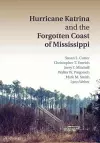
Hurricane Katrina and the Forgotten Coast of Mississippi
6 authors - Paperback
£46.99
Susan L. Cutter is Carolina Distinguished Professor of Geography at the University of South Carolina and Director of the Hazards and Vulnerability Research Institute. Her primary research interests are in the area of hazard vulnerability/resilience science. She has authored or edited twelve books and more than 150 peer-reviewed articles and book chapters. Dr Cutter serves on many national and international advisory boards and committees, including the US National Research Council, US National Science Foundation, Intergovernmental Panel on Climate Change, and the Science Committee of the Integrated Research on Disaster Risk Program. She is an executive editor of Environment and associate editor for Weather, Climate, and Society. In 2010, Dr Cutter received the Lifetime Achievement Award from the Association of American Geographers, and in 2013 she was a recipient of the prestigious Southeastern Conference Faculty Achievement Award. Her most recent book is Hazards, Vulnerability, and Environmental Justice (2006). Christopher T. Emrich is a Research Assistant Professor in the Hazards and Vulnerability Research Institute at the University of South Carolina. His primary research interests are in the development and application of geospatial technologies in emergency management. He has taught at the University of South Florida and worked for the Federal Emergency Management Association (FEMA) as a Mitigation GIS Specialist at the Florida Disaster Field Office (2004–5), GIS Unit Leader for the Jackson Mississippi Joint Field Office (2006), GIS Unit Leader for the Florida Long Term Recovery Office (2006–7), and as a geospatial liaison to FEMA headquarters for the New Orleans Gulf Coast Recovery Office during the run-up to the three-year anniversary of Hurricane Katrina. Jerry T. Mitchell is the Director of the Center of Excellence for Geographic Education and a Research Associate Professor at the Hazards and Vulnerability Research Institute, both at the University of South Carolina. He is also editor of the Journal of Geography. His primary research interests lie in cultural responses to disaster, the use of geospatial technologies for vulnerability assessments, and hazards education. Prior to joining the University of South Carolina faculty in 2004, he was an Associate Professor of Geography at Bloomsburg University. He was awarded a Distinguished Teaching Achievement award from the National Council for Geographic Education in 2012. Walter W. Piegorsch is the Director of Statistical Research and Education at the University of Arizona's BIO5 Institute. He is also a Professor of Mathematics, Professor of Public Health, and former Chair of the University's Graduate Interdisciplinary Program in Statistics, and he holds accreditation as a Professional Statistician from the American Statistical Association. His research focuses on environmental data analytics, with emphasis on environmental hazards and risk assessment. He is the editor-in-chief of the journal Environmetrics, former joint-editor of the Journal of the American Statistical Association (Theory and Methods Section) and has served on numerous other editorial and scientific review boards. His most recent book is Encyclopedia of Environmetrics, 2nd edition (2012). Mark M. Smith is Carolina Distinguished Professor of History at the University of South Carolina. A specialist in southern history, race relations and sensory history, he has authored or edited a dozen books, including, most recently, Camille, 1969: Histories of a Hurricane (2011). His work has been featured in The New York Times, The Times, Science, Brain, and the Chronicle of Higher Education. A former president of The Historical Society, Professor Smith has lectured in China, Australia, Europe, and throughout the United States. He regularly reviews books for The Wall Street Journal. Lynn Weber is a Professor of Psychology and Women's and Gender Studies at the University of South Carolina. For more than thirty years, she has led in developing the field of intersectionality – examining the nexus between race, class, gender, sexuality, and other dimensions of inequality. In addition to her work on the Mississippi Gulf Coast and in conjunction with a national research network on persons displaced by Hurricane Katrina, she and Lori Peek edited Displaced: Life in the Katrina Diaspora (2012).